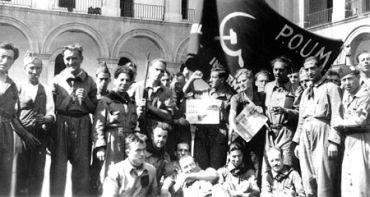George Orwell on Henry Miller: Inside the Whale

George Orwell's most interesting essay -- in the technical sense -- of the puzzle that is Miller's status as an author of "literature" has been posted to the web, along with the rest of Orwell's published works, by the University of Newcastle, Austrailia.
Although "Inside the Whale" and Orwell's other works are still copyrighted in the United States, they've already passed into the public domain in Austrailia, under Austrailia's copyright limitation of 50 years after an author's death. So take advantage of the discrepancy and, if you've never read Orwell on Henry Miller and the other "high art" authors of his day, go down under for it [now] at "Inside the Whale" (1940).
(I won't comment, except in passing, on the Dead Hand effect of the "Sonny Bono Copyright Term Extension Act of 1998," which extends copyright protection for 70 years past an author's death and, additionally, locks up everything published after 1923 until 2019, almost a full century. One should not be deceived that the purpose of this act is to advantage the children, grandchildren, great-grandchildren, and even great-great-grandchildren of creative talent, as if anyone ever deserved financial compensation for the accomplishments of a grandparent, let alone a great-great-grandparent. No, this act, which might better have been named the "Disney Mickey Mouse Profits Act of 1998," is designed to advantage the corporate exercisers of these "rights" against the domain of public interest. Why 1923? Must be just coincidental that 1923 was the year Walt Disney arrived in Hollywood with his sketchbook. Yes, I got you, babe with a vengeance.)
In reading George Orwell's "Inside the Whale," it's worth bearing in mind that Orwell, who after all published his own Down and Out in Paris and London in 1933, and Miller are divided not as much by personal or literary sensibility, as they are divided by politics.
And there the clash of these two grand "outsiders" could be no more extreme, no more anti-thetical,, no more querulously anti-thetical, nor more grandly comic, than life -- even for the best and the worst of us -- inevitably is. At least, I have a hard time not grinning to myself, every time I imagine these two -- the two, among my favorite authors -- actually meeting, as they did in Paris in 1936:
I first met Miller at the end of 1936, when I was passing trrough Paris on my way to Spain. What most intrigued me about him was to find that he felt no interest in the Spanish war whatever. He merely told me in forcible terms that to go to Spain at that moment was the act of an idiot. He could understand anyone going there from purely selfish motives, out of curiosity, for instance, but to mix oneself up in such things from a sense obligation was sheer stupidity. In any case my Ideas about combating Fascism, defending democracy, etc., etc., were all baloney. Our civilization was destined to be swept away and replaced by something so different that we should scarcely regard it as human-a prospect that did not bother him, he said. And some such outlook is implicit throughout his work. Everywhere there is the sense of the approaching cataclysm, and almost everywhere the implied belief that it doesn't matter. The only political declaration which, so far as I know, he has ever made in print is a purely negative one. A year or so ago an American magazine, the Marxist Quarterly, sent out a questionnaire to various American writers asking them to define their attitude on the subject of war. Miller replied in terms of extreme pacifism, an individual refusal to fight, with no apparent wish to convert others to the same opinion-practically, in fact, a declaration of irresponsibility.
It's a great misfortune that, today in America, Orwell is best known for 1984 and Animal Farm, both a bit tedious and "overdone" as political allegories. Far superior, by almost any measure, is Orwell's first-person account of fighting and politics, in the trenches and in the streets, during the Spanish Civil War, Homage to Catalonia (1938).
And why is Orwell so little known in America for Homage to Catalonia? Little doubt because the ideological uses to which all points of the political spectrum put the creator and denouncer of "Big Brother" would suffer if it were equally well known that he fought, most sympathetically, for the POUM (Workers Party of Marxist Unification) in Spain.

rri (April 12, 2005)

